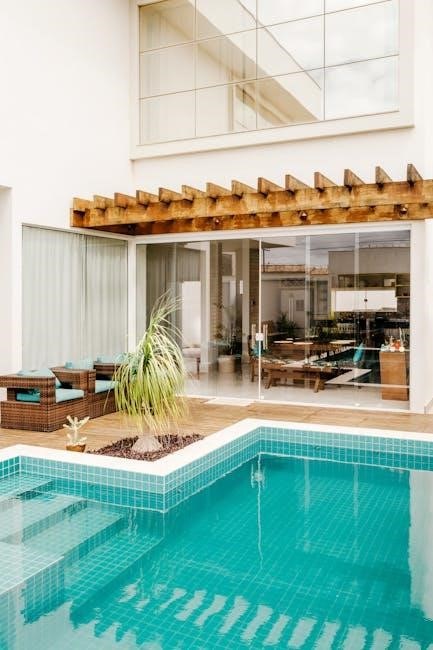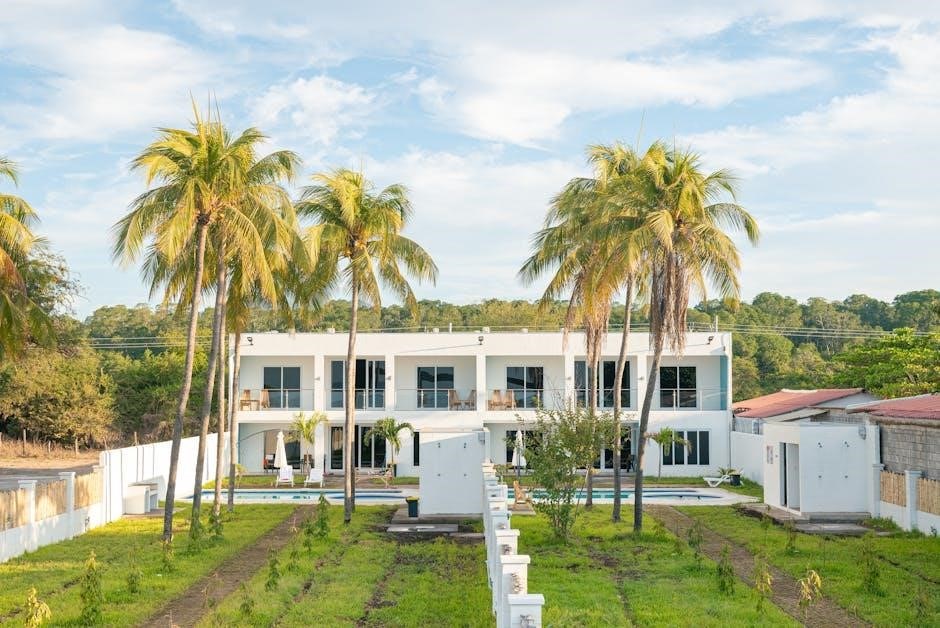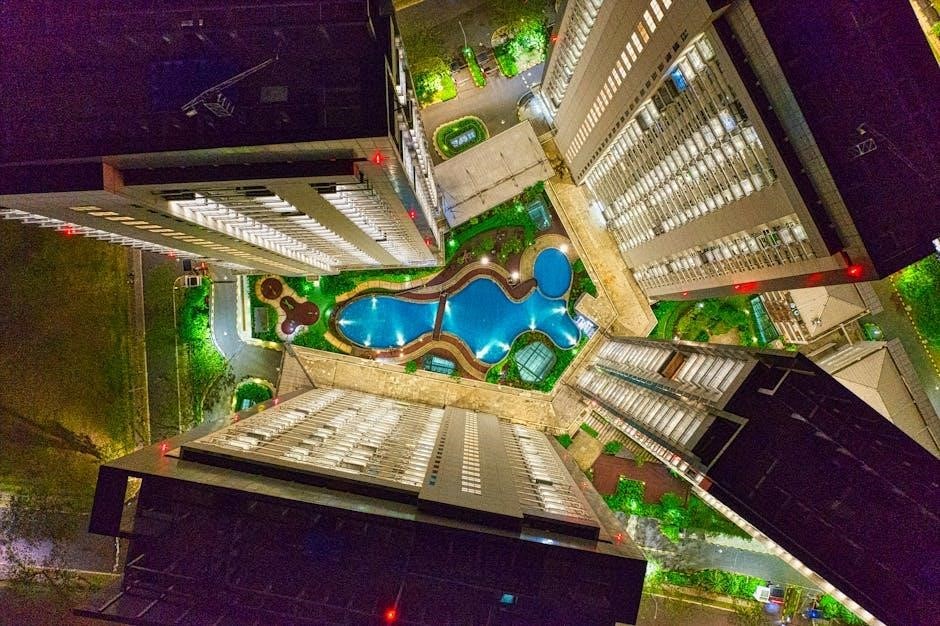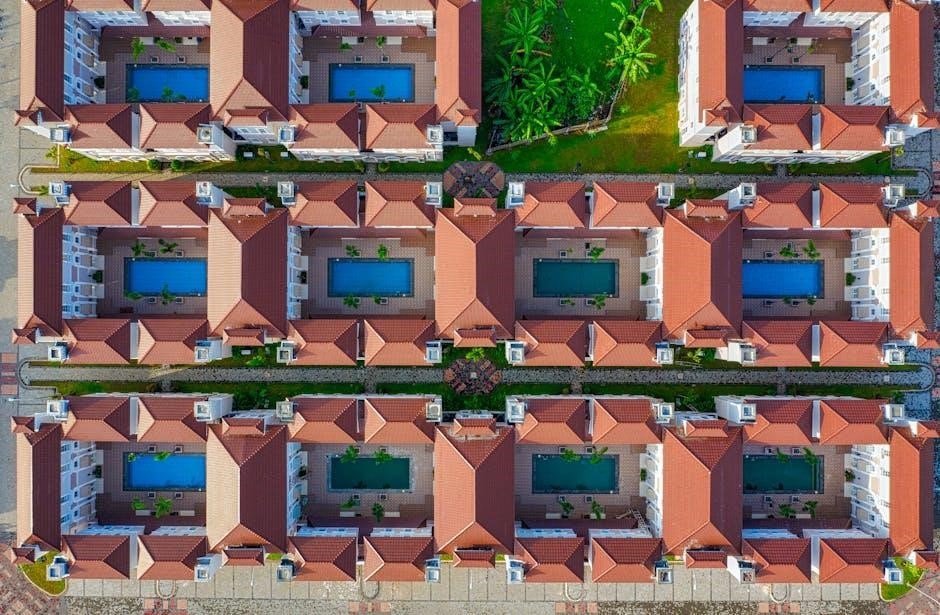Overview of Pennsylvania Residential Pool Regulations
The Pennsylvania residential pool regulations ensure safety, compliance, and environmental protection through the Uniform Construction Code, permits, and specific safety standards for installation and maintenance․
Pennsylvania’s residential pool regulations combine state and local codes to ensure safety, compliance, and environmental protection․ The Pennsylvania Uniform Construction Code (PA UCC) provides statewide standards, while local municipalities may enforce additional requirements․ These codes address elements like pool placement, fencing, and electrical systems, ensuring harmony with community standards and safety protocols․ Compliance with both state and local regulations is essential for legal installation and operation․
Key Components of the Pennsylvania Uniform Construction Code (UCC)
The Pennsylvania Uniform Construction Code (UCC) establishes comprehensive standards for residential pool installations․ Key components include design and construction criteria, safety barriers, electrical installations, and environmental impact assessments․ The UCC mandates compliance with national codes like the International Residential Code (IRC) and Appendix G for swimming pools․ It also addresses permits, inspections, and specific safety features such as fencing and gate requirements to ensure public safety and structural integrity․
Permits and Approvals
A permit is required for pools deeper than 24 inches, including installation of decks, fences, and heaters․ Applications must include a plot plan and PA One Call verification․
When a Permit is Required for Pool Installation
A permit is required for any swimming pool deeper than 24 inches, including in-ground, above-ground, and semi-in-ground pools․ Temporary pools exceeding this depth also need approval․ Permits ensure compliance with safety and construction standards, covering pool installation, decking, fencing, and heating systems․ Failure to obtain proper permits can result in legal consequences or installation halts․ Always verify with local authorities for specific requirements․
Documentation Needed for the Permit Application
The permit application requires a plot plan showing property setbacks, pool location, and dimensions․ Include a detailed electrical plan approved by a third party, PA One Call serial number, and specifications for decking, fencing, and equipment․ Compliance with local and state codes must be demonstrated․ Submit all required documents to ensure a smooth approval process and avoid delays in pool installation․

Safety Standards and Requirements
Pennsylvania mandates strict safety measures, including pool barriers, fencing, and gates․ Compliance with GFCI protection, receptacle placement, and IRC standards ensures a secure swimming environment for residents․
Pool Barriers and Fencing Regulations
Pennsylvania requires pool barriers to be at least 48 inches tall, with no gaps exceeding 4 inches․ Fencing materials must be durable and non-climbable․ Gates must be self-latching and self-closing, opening outward․ Direct access from the home to the pool area is prohibited․ These rules aim to prevent accidental drowning and ensure child safety․ Compliance with these standards is mandatory for all residential pools in Pennsylvania․
Gates and Latching Mechanisms for Pool Safety
Gates for pool areas must be self-latching, self-closing, and open outward․ Latches must be at least 54 inches above the ground to prevent children from accessing the pool․ Gates should be secure and comply with the Pennsylvania Uniform Construction Code (PA UCC)․ Regular inspections are required to ensure proper function and safety․ These measures are critical to preventing accidental drowning and ensuring compliance with state regulations․

Electrical Requirements

All pool-related electrical equipment must have Ground Fault Circuit Interrupter (GFCI) protection․ Receptacles near pools require GFCI and must be at least 6 feet away․ Compliance with International Residential Code standards is mandatory for safety and legal adherence․
Ground Fault Circuit Interrupter (GFCI) Protection
GFCI protection is required for all electrical equipment associated with pools, including pumps, heaters, and lighting․ This safety measure interrupts power in case of ground faults, preventing shocks․ Receptacles near pools must be GFCI-protected and installed between 6 to 20 feet from the pool’s edge․ Compliance ensures electrical safety and adherence to Pennsylvania’s Uniform Construction Code and International Residential Code standards․
Receptacle Placement and Protection
Receptacles near swimming pools must be GFCI-protected and installed between 6 to 20 feet from the pool’s edge․ They should be weatherproof and securely covered when not in use․ Pool pumps and heaters require dedicated, GFCI-protected receptacles․ These requirements ensure safe electrical connections, preventing shock hazards and meeting Pennsylvania’s Uniform Construction Code and International Residential Code standards for pool installations․
Sanitation and Water Quality
Pennsylvania regulations mandate proper chemical usage, regular water testing, and adherence to disposal guidelines to maintain clean, safe pool water and prevent environmental contamination․
Disposal of Swimming Pool Water
Pennsylvania regulations prohibit discharging swimming pool water into waterways without a permit, violating the Clean Streams Law․ Pool water must be disposed of through approved methods, such as municipal sewer systems or designated drainage areas․ Proper treatment and testing may be required to ensure compliance with environmental standards, preventing contamination of local water sources and ecosystems․ Always check local ordinances for specific disposal guidelines and permits․
Chemical Usage and Maintenance Guidelines
Proper chemical usage is crucial for maintaining safe and clean pool water․ Pennsylvania regulations emphasize adhering to manufacturer guidelines for disinfectants and pH levels to prevent health risks․ Regular testing of chlorine and pH levels is required, and adjustments must be made to ensure optimal water quality․ Improper chemical use can lead to contamination or equipment damage, so strict adherence to maintenance schedules is essential for residential pools․

Zoning Laws and Property Setbacks
Zoning laws require pools to be set back from property lines, typically 10 feet from side and rear lines․ Front yard placement is prohibited in most areas․
Minimum Setbacks from Property Lines
Residential pools must maintain minimum setbacks of 10 feet from side and rear property lines, as required by local zoning regulations․ Front yard installation is generally prohibited; Exceptions may apply for larger properties or unique lot configurations․ A plot plan detailing setbacks must be submitted with permit applications to ensure compliance with Pennsylvania Uniform Construction Code standards․

Prohibited Locations for Pool Installation
Pools cannot be installed in front yards or within 10 feet of water sources, wetlands, or floodplains․ Installation is also prohibited in areas that interfere with utility easements or drainage patterns․ Specific local ordinances may further restrict pool placement near environmentally sensitive areas or historic sites․ A plot plan must confirm compliance with these restrictions to avoid permit rejection․

Deck and Fence Requirements
Decks must be designed to support intended loads and meet local building codes․ Fences around pools are required to ensure safety, with specific height and material guidelines․
Deck Construction and Material Standards
Decks around residential pools must be constructed with durable, weather-resistant materials like concrete, wood, or composite decking․ The deck must support the intended load and meet local building codes․ Railings are required for elevated decks, and all surfaces should be slip-resistant․ Proper drainage and structural integrity are essential to ensure safety and compliance with Pennsylvania’s Uniform Construction Code․ Permits and inspections may be required for construction․

Fence Height and Material Specifications
Fences around residential pools must be at least 48 inches tall and constructed from durable, weather-resistant materials such as wood, metal, or vinyl․ Gates must be self-closing and self-latching, with latches placed at least 54 inches above the ground․ The fence must prevent unauthorized access and meet local building codes․ Openings in the fence should not exceed 4 inches in width to ensure safety and compliance with Pennsylvania pool regulations․
Environmental Impact Considerations
Regulations address proper drainage systems to prevent water runoff and protect local ecosystems, ensuring pool installations minimize environmental disruption and conserve water resources effectively․
Drainage and Water Disposal Regulations
Proper drainage systems must be implemented to prevent water runoff and protect local water sources․ Pool water disposal requires permits and adherence to guidelines to avoid environmental contamination․ Backflow preventers are mandatory to prevent sewer or waterway contamination․ Dechlorination or neutralization of pool chemicals is necessary before disposal to protect aquatic life․ Violations may result in penalties under state environmental laws․
Impact on Local Ecosystems and Water Sources
Residential pool regulations in Pennsylvania emphasize protecting local ecosystems and water sources from contamination․ Discharging chlorinated or chemically treated pool water into sewers or waterways without proper treatment is prohibited․ This prevents harm to aquatic life and maintains water quality․ Violations of these regulations can lead to environmental damage and legal consequences under state and federal environmental protection laws․

Compliance Inspections
Compliance inspections ensure Pennsylvania residential pools meet safety and code requirements․ Local authorities conduct pre-installation and final inspections, verifying adherence to regulations․ Non-compliance may result in penalties․
Pre-Installation and Final Inspections
Pre-installation inspections verify compliance with permits, plot plans, and setbacks, while final inspections ensure all safety standards, electrical systems, and barriers are correctly installed․ Local authorities conduct these checks to enforce regulations, ensuring pools meet Pennsylvania Uniform Construction Code requirements before operation begins․
Consequences of Non-Compliance
Non-compliance with Pennsylvania pool regulations can result in fines, legal action, and permit suspension․ Property owners may face enforcement measures, including orders to cease pool use until violations are corrected․ Repeat offenses can escalate penalties, potentially leading to higher fines or even legal proceedings․ Compliance is crucial to avoid financial and legal consequences while ensuring safety and environmental protection․
Additional Resources and References
Refer to the Pennsylvania Uniform Construction Code (PA UCC) Swimming Pool Requirements Document and local municipal codes for detailed compliance guidelines and specific regulations․
PA UCC Swimming Pool Requirements Document
The Pennsylvania Uniform Construction Code (PA UCC) Swimming Pool Requirements Document provides detailed guidelines for residential pool installations, including permit requirements, safety standards, and electrical guidelines․ It ensures compliance with state and local regulations, focusing on pool construction, barriers, and environmental impact․ The document applies to both in-ground and above-ground pools, outlining specific code adherence to guarantee safety and proper installation practices․ It is updated periodically to reflect current codes and best practices․
Local Ordinances and Municipal Codes
Local ordinances and municipal codes in Pennsylvania vary by jurisdiction but must comply with the PA UCC․ Municipalities may impose additional requirements, such as specific setback distances, fence heights, or permit processes․ For example, some townships require a minimum 10-foot setback from property lines for pools and decking․ Local regulations also address zoning restrictions, ensuring pools are not installed in prohibited areas․ Compliance with both state and local rules is essential for legal installation and operation․ Always consult local authorities for specific municipal guidelines to avoid violations and ensure proper permitting and inspections․


